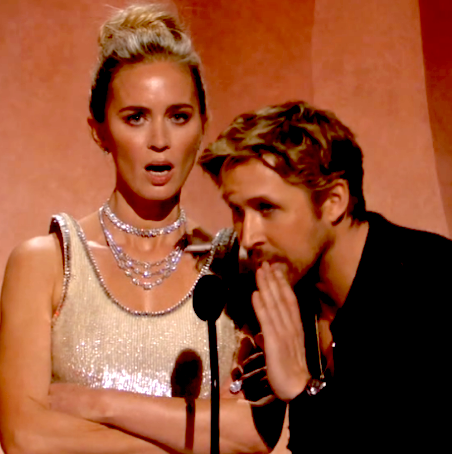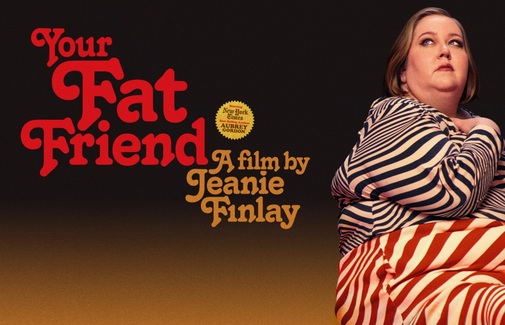Review: "Your Fat Friend" Is a Sigh of Relief and a Necessary Reflection
 Tuesday, December 12, 2023 at 10:00PM
Tuesday, December 12, 2023 at 10:00PM Not to be indulging in self-pity, but I think it's fair to say that existing as a fat person in our world is a complicated affair. And I'm not talking about the physical realities of being fat. Instead, it's how people see and treat you that irks, how so much of our society is full of insidious anti-fat bias, from the doctor's office to pop culture, from total strangers to those who call themselves your friends. Social codes so often teach us to conflate fatness with moral rot, laziness, stupidity, the worst of humankind, and something worthy of disgust. Feeling unlovable, inward hate is the inevitable endpoint. What's worse is that when you try to call attention to it, you're often met with euphemistic justifications or treated as if what you're saying is nonsense.
Even those who putatively sympathize can be doing more harm than good, confusing what they feel for empathy when it's pity. Look no further than last year's The Whale, an odious work that proposed a humanizing view of fatness by reveling in its assumed tragedy. And yet, many people I respect loved it, expounding about its "merits" in ways that had me question what they must think when they gaze upon my person. Well, they were not alone, seeing as that trash won two Oscars. To them and others, I'd like to propose Jeanie Finlay's Your Fat Friend as a necessary watch. While not a perfect documentary, seeing it felt like releasing a breath I didn't know I was holding…

You might have heard of Aubrey Gordon before. She's a writer, activist, and podcaster who's been combating anti-fatness for a while now. In the public eye, her journey started when she penned an open letter titled "A request from your fat friend: what I need when we talk about bodies" under the pseudonym Your Fat Friend. From then on, her career flourished, gaining widespread attention under the shield of anonymity. Gordon put into words experiences felt by countless fat people worldwide, illuminating how prejudice has shaped lives and culture. Her candor was as impressive as her ability to put forward thoughtful and convincing arguments.
As her impact grew, articles piling up, and a book on the horizon, Gordon revealed her identity and continued to fight the good fight. Even before seeing this documentary, I considered myself a fan of both her writing and her work as co-host of the Maintenance Phase podcast. In moments of despair, her words could galvanize and comfort, offering a path forward, and even glimpses of hope. Being gaslit by society makes one feel crazy, but following Gordon's lead proved a guide to lucidity. Insults on the street, dirty looks, scathing remarks by people who think they know you when they really don't – all more easily withstood when you remember to love yourself and recognize the systems against you.
Setting aside that personal experience of self-worth boosting, her work remains important. Moreover, she'd be the first to declare that confidence isn't enough. You can't love yourself out of oppression. Because of that, I've often found myself wanting to recommend Gordon to others, especially those most skeptical about the pervasiveness and damage of anti-fatness. It's not easy to convince someone to read a plethora of articles, listen to hours upon hours of a podcast, or consume whole books. A 96-minute documentary, however, feels like a better prospect and an excellent weapon in the arsenal. The film can be an introduction to new ideas through the engines of cinema functioning as the empathy machine rather than Aronofsky's fountain of revulsion.
That's not to say director Jeanie Finlay's efforts can be reduced to an Aubrey Gordon ad or a mere educational tool.
Right from the start, when Finlay and DP Stewart Copeland shoot the writer's figure in a bathing suit, one can sense a certain radicalism in Your Fat Friend. The camera challenges the viewer without demonizing the body it depicts. It's a celebration rather than a mere exercise in gawking at some object that earns your horror. It's a negotiation of glamour and frankness, culminating in what's maybe the most beautiful shot ever produced on the subject of stretch-marked skin. Like Gordon's activism, these images are a disruption of ideas held on for far too long, as if translating her message into pictorial terms unique to the medium.

Such visual eloquence doesn't always manifest throughout Your Fat Friend. Like many modern docs, it stumbles into the pitfalls of vlog-like footage, depersonalized drone shots, and standard interview set-ups. Thankfully, none of it erases the doc's points or fumble its ideas. Indeed, even with uninspired stagings, the film still accomplishes some visual wit. Think of Gordon's collection of vintage diet books, including some hilarious-titled ones that define fatness as the devil's work and implies thinness is godly. Then there's the depiction of the subject as a working writer whose methods can be on the silly side. Gordon herself recognizes the absurdity in her habit of driving around in her tiny car, stopping to type away in the cramped space when the inspiration strikes.
Between bouts of cackling, Finlay and Gordon can be incisive, too. A look at airplane seating is revealing, opening a conversation about how public spaces aren't designed for bigger bodies and force them into the discomfort of physical and mental exclusion. The writer details the anxiety of flying, practicing making herself small so there's no physical contact with someone who might react with anger or disgust. Grumblings about medical prejudice are like acid on the skin but no less truthful, inciting anger while rousing solidarity. Your Fat Friend further goes into the rebranding of diet culture as the trillion-dollar wellness industry and the social performance demanded of fat people. On that latter point, I couldn't help but remember how, until recently, I felt uncomfortable eating in front of other people as much as possible.
So many ideas are floating about that the project can feel ambitious to the point of internal collapse. But there are also instances when the viewer wants more development. For example, I wished the film engaged with the political moment more explicitly and how social media is littered with people weaponizing and justifying anti-fat prejudice when it's against those deemed worthy of scorn by other metrics. In the end, though, the film is a portrait, attempting to reach a universal message through specificity. When it falls into self-congratulatory faff – too many famous Twitter cameos – it's still celebrating the kind of person who's drastically unrepresented and certainly undercelebrated in media.
The individual prism also allows Your Fat Friend to reach depths separate from Gordon's other work. It may sound paradoxical, but it happens mostly through the camera's ability to interrogate, to perceive behavioral cues. This is apparent when Finley focuses her gaze on her subject's parents, studying how one generation teaches the next, how someone can hurt those they love without invalidating that love. There's the reflection of a mother who took her 13-year-old to Weight Watchers, an intersection of gender pressures with maternal responsibility. There's the tension with a father who learned how to be controlling from his father, and made his daughter feel stigmatized when doing something as commonplace as eating her meals.
Ultimately, Your Fat Friend is not an absolute social diagnosis or a solution. It's a sharing gesture, the opening up of one woman to her audience as an opportunity for elucidation. It's the start of a conversation but not the end. That will take more than a movie.

Your Fat Friend is currently enjoying an Oscar-qualifying run in New York City. Hopefully, it'll get wider distribution later on. As far as I'm concerned, everyone should watch it.
 Aubrey Gordon,
Aubrey Gordon,  Film Review,
Film Review,  Jeanie Finlay,
Jeanie Finlay,  Reviews,
Reviews,  documentaries
documentaries 


